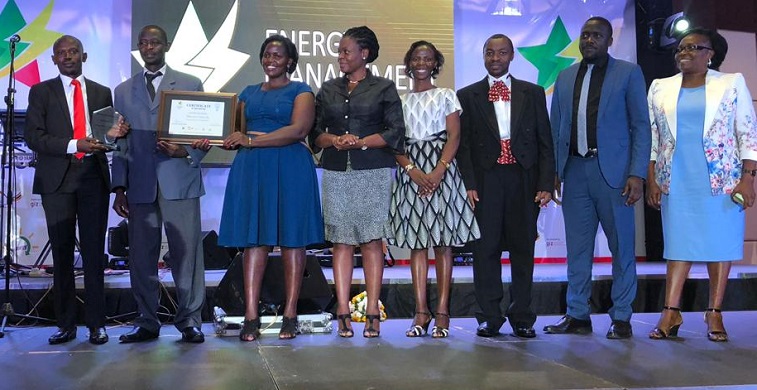On 31st August 2018, Makerere University received the Best Energy and Management Practices Service Sector (Universities) Award in recognition of undertaking a number of energy management techniques and strategies that have significantly contributed to efficient utilization of energy.
Organized by the Ministry of Energy and Mineral Development in partnership with GIZ, Promotion of Renewable Energy and Energy Efficient Programme (PREEEP), the Energy Management Awards (EMAs) 2018 held at Pearl of Africa Hotel, attracted a total of 27 large and media scale enterprises including Universities.
Eng. Simon M. Kalanzi from the Ministry of Energy and Mineral Development said that the Energy Management Awards (EMAs) 2018 aimed at promoting responsiveness on energy management among energy intensive facilities as well as helping consumers understand the value of excellence in energy efficiency and conservation. Eng. Kalanzi revealed that a technical committee of Seven (7) members identified by the Ministry of Energy and Mineral Development evaluated the Expression of Interest and informed those who qualified to participate in the Awards.

What stood out for Makerere University?
According to Eng. Christina Kakeeto, the Estates and Works Department submitted a number of energy management practices undertaken by Makerere University. The practices illustrated how the institution embarked on various practices aimed at reducing high energy consumption.
“Two years back, we could switch on and off the street lights manually. But this act was both time and energy consuming. We had to go light by light to ensure that they are either switched on or off,” she explained.
Eng. Kakeeto explained that Makerere University introduced the automated street lighting system that has enabled the institution to automatically switch on and off the lights at specific time intervals. She highlighted that the University installed low consuming security lights around campus.
“Previously, we had high energy consuming security lights of 250 watts per light. However, using the phased approach, we have replaced these lights with a number of lower consuming fittings of 56watt flood lights, 108watt flood lights, 125watt sodium lights and 150 watt LED Security lights,” she mentioned.

The Assistant Estates Manager Mr. Darius Muwanguzi said that the Estates and Works Department has carried out regular energy audits with the involvement of user units especially those with high consuming energy records in order to come up with energy saving opportunities as well as recommendations on the best energy management practices.
“Working with other partners, we have also staged various campaigns to create awareness and sensitize our fellow staff and students on how we can reduce high consumption of energy in the University. We believe that energy conservation can reduce on our expenditure,” he said.
In his congratulatory remarks, the Vice Chancellor of Makerere University Prof. Barnabas Nawangwe applauded the team in Estates and Works Department for implementing innovative energy management practices that have been recognized by the Government through the Ministry of Energy and Mineral Development. The Vice Chancellor pledged to continue championing the implementation of best energy management practices in the University.
The Makerere University Award was received by the Director of Estates and Works, Eng. Christina Kakeeto in the company of Mr. Darius Muwanguzi – Assistant Estates Manager, Dr. Florence Nakayiwa- Director Planning and Development Department; Mr. Yusuf Kiranda- Deputy University Secretary; Mr. Paul Sabakaaki-Manager in charge of the Electrical Section, Estates and Works Department, Ms. Caroline Namutosi-Civil Engineer, Estates and Works Department; Ms. Ritah Namisango-Principal Public Relations Officer; Mr. Gordon Murangira-Personal Assistant to the Vice Chancellor and Ms. Proscovia Nabatte- Assistant Communication Officer.
Article by: Mak Public Relations Office


 General17 hours ago
General17 hours ago
 General16 hours ago
General16 hours ago
 Humanities & Social Sciences2 weeks ago
Humanities & Social Sciences2 weeks ago
 General1 week ago
General1 week ago
 Agriculture & Environment2 weeks ago
Agriculture & Environment2 weeks ago




